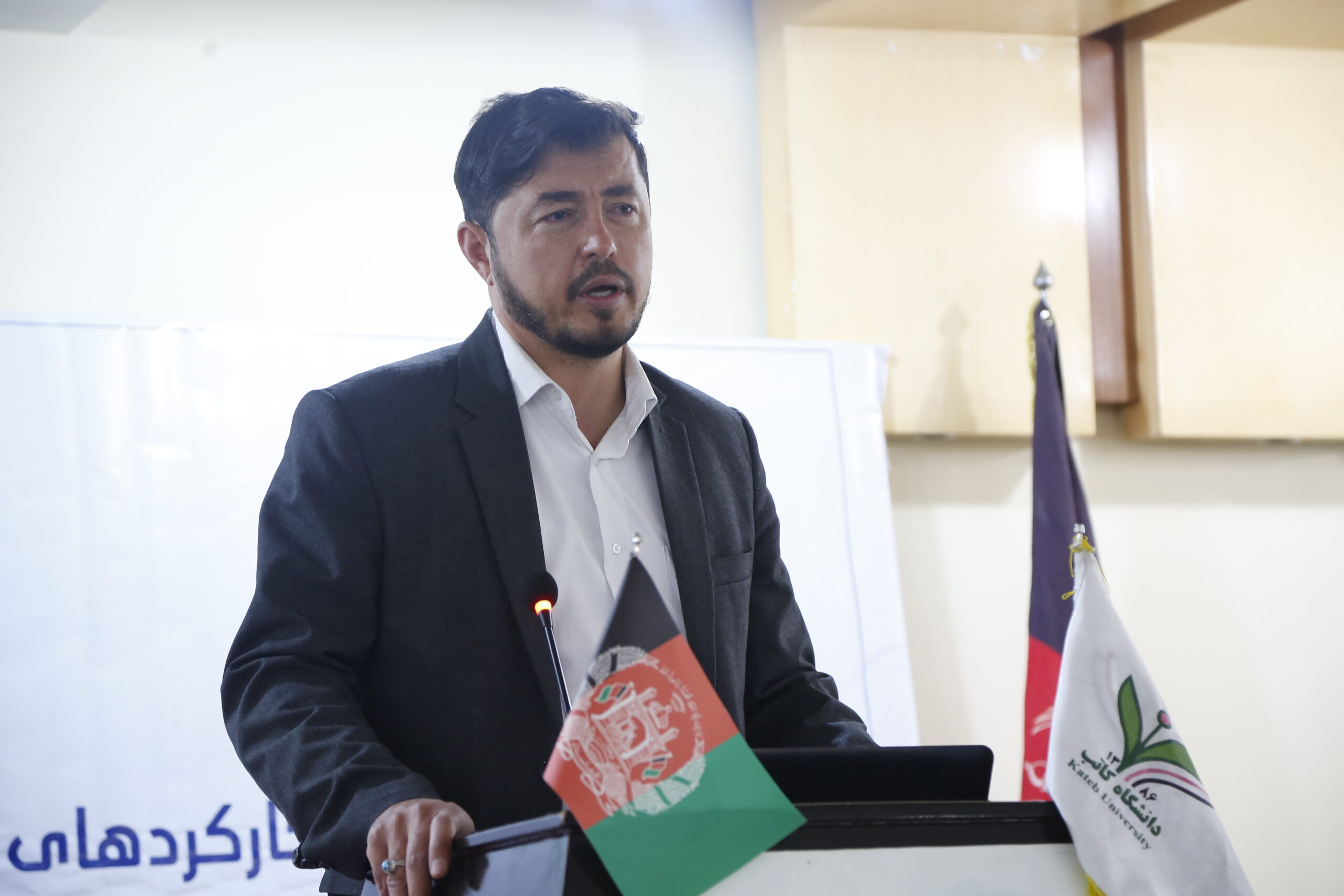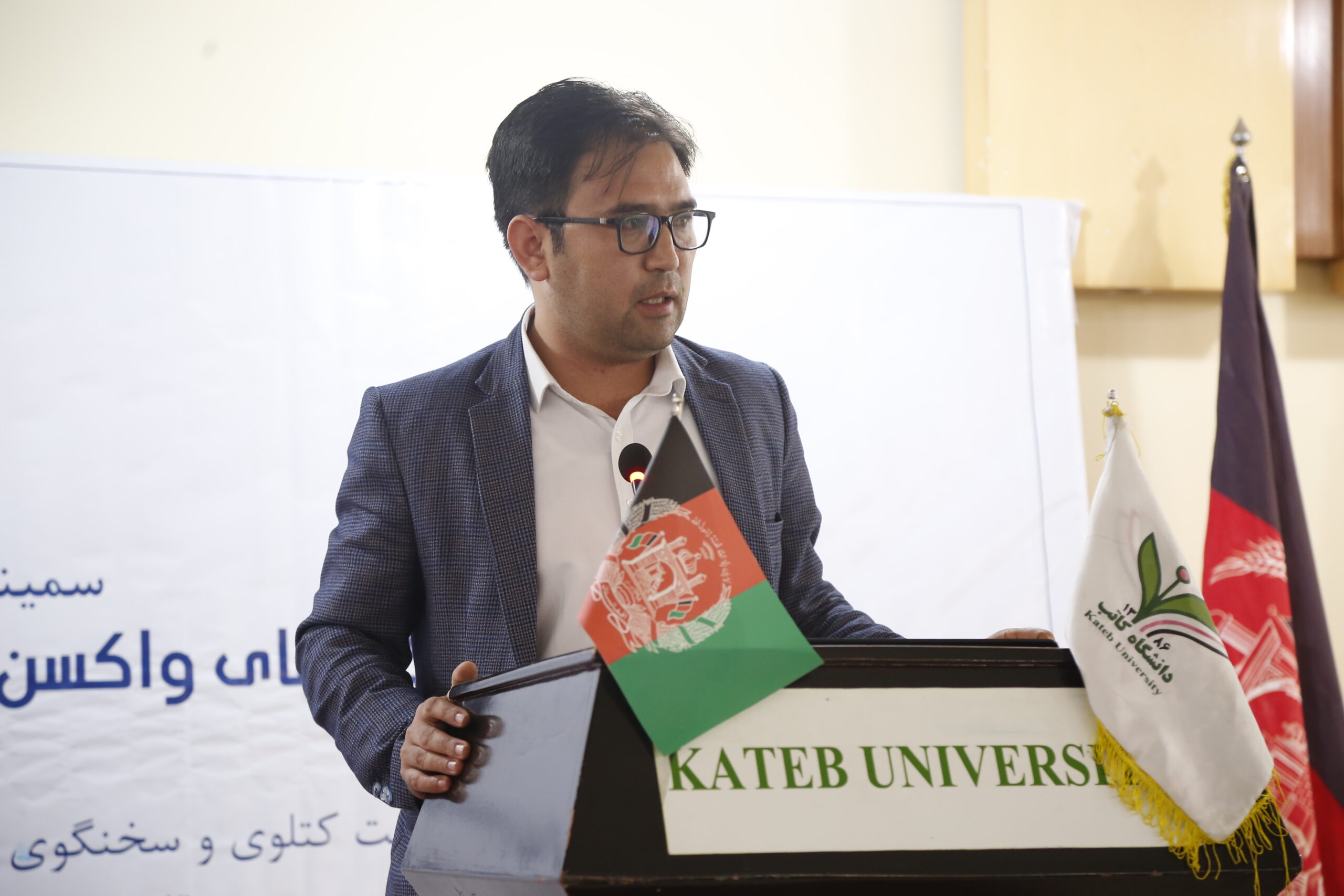Celebrating the World Vaccine Week, the Kateb Research Center, in collaboration with the Medicine Faculty, organized a seminar entitled “Functions of Covid-19 Vaccine in Afghanistan: Actions and Consequences” on Thursday, April 29, 2021, from 9:00 a.m. to 11:00 a.m. in the conference hall of master’s branch. In this seminar, Dr. Sayed Hamid Mousavi, Head of Kateb Research Center, Sir Rohullah Roien, a lecturer at Medicine Faculty, Dr. Dastgir Nazari, Head of Katlavi Exemption and Spokesperson of the Ministry of Public Health, and Dr. Tamim Juda Naibkhel from Afghanistan National Institute of Special Diseases Presented their scientific seminars.
The seminar by the speech of Dr. Sayed Hamid Mousavi, Head of Kateb Research Center who spoke about the importance of vaccine coverage in all parts of the country and the situation in neighboring countries, especially the virus spread in Indian. Additionally, he explained that by maintaining good health and timely vaccination, we can have a good chance to prevent the disease.
Dr. Ruhollah Roien, a lecturer at Kateb University, gave a detailed explanation about the vaccine, its importance and effect in the prevention of infectious diseases, and new developments in the field of vaccine production, including the development of RNA and viral vector vaccines, DNA, recombinant vaccines, etc. Mr. Roien gave information about the types of COVID-19 Vaccine and said that vaccines that have been approved for COVID-19 or in different stages of clinical trials include mRNA vaccines (Pfizer and Modern vaccines), viral vector vaccines (AstraZeneca, Johnson, Sputnik V vaccines), inactivated virus vaccines (Sinovac, Sinopharm, Co vaccine) and vaccines Novovacs, and provided detailed information on the characteristics, efficacy, clinical approval steps, side effects, uses, and storage conditions of each of these vaccines.
In the following, Dr. Dastgir Nazari presented his specialized topics in a very comprehensive and accurate manner, the most important points of which can be mentioned as follows:
The Afghan Ministry of Public Health is responsible for administering millions of vaccine doses annually throughout the country.
Dr. Nazari pointed out that; around 13 types of vaccines are available in the country for free for children under 5 years and women of childbearing age. In order to prevent and control the coronavirus (especially the third wave), in addition to getting the corona vaccine, preventive measures such as wearing a mask, maintaining physical and social distance, washing hands, and other hygienic measures are necessary.
The corona vaccine, which is available to the Ministry of Public Health, is of the Covishield type, made in India. This vaccine is completely safe and so far no direct link between blood clotting and the vaccine has been established in several studies. The effectiveness of this vaccine is excellent (76 to 85%), and most importantly, it prevents nearly 100% of severe cases and hospitalization due to coronary heart disease. At this stage, all people over 18 years (except pregnant and lactating women) are eligible to receive the vaccine. So far, about 33,444 of our compatriots, including health workers, teachers, and others at risk, have been vaccinated.
Following the seminar, Dr. Sahib Tamim Jade Naibkhel presented valuable points on the importance of using the vaccine and that after the universal coverage of the vaccine in all parts of Afghanistan, basic research should be done on the responses of this vaccine in different people, and at the end of the seminar, a number of professors and the university staff received the first dose of this vaccine by the specialized staff of Covid-19 vaccination.


Comment is not allowed